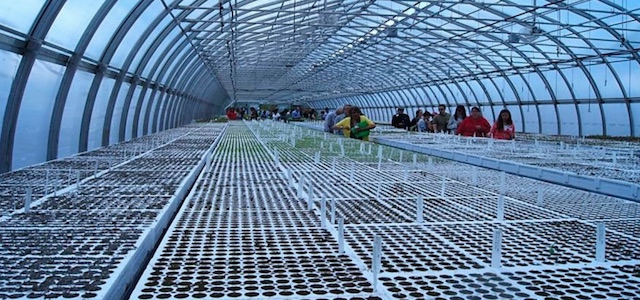
Features
Alternative Fuels
Energy
B.C. nursery investing in clean energy
October 1, 2015 By B.C. Ministry of Aboriginal Relations and Reconciliation
 The Saulteau First Nations are replacing a plant nursery’s propane heating with a biomass heating system, with funding support from BC’s First Nations Clean Energy Business Fund. B.C. Ministry of Aboriginal Relations and Reconciliation
The Saulteau First Nations are replacing a plant nursery’s propane heating with a biomass heating system, with funding support from BC’s First Nations Clean Energy Business Fund. B.C. Ministry of Aboriginal Relations and ReconciliationOct. 1, 2015, Moberly Lake, B.C. – The Saulteau First Nations are replacing a plant nursery’s propane heating with a biomass heating system, with funding support of $150,000 from B.C.’s First Nations Clean Energy Business Fund.
To be developed in partnership with West Moberly First Nations, the upgraded biomass heating system for the Twin Sisters Native Plant Nursery will initially heat two existing greenhouses, with the capability of supporting two additional greenhouses as they are built.
Although some carbon emissions are caused by wood-burning, biomass heating systems, these are much lower than the emissions from fossil fuels such as propane.
The nursery, located in Moberly Lake, grows plant species used in site reclamation by the mining and oil and gas industries. By addressing the shortage of local plant stock for reclamation in Northern B.C., the nursery is playing an important role in helping to restore post-industrial lands to natural, healthy and productive ecosystems.
NEW ECONOMIC OPPORTUNITIES
Funding for this project and other agreements is part of the Province’s commitment to reconciliation with First Nations. This includes ensuring more nations are involved in economic opportunities that make their communities and the rest of the province stronger.
“The Saulteau and West Moberly First Nations are helping to meet the demand for specialized nurseries capable of providing local-area plants for reclamation use,” said Mike Bernier, MLA, Peace River South.
“By upgrading the nursery with the new heating system, they are showing real leadership in the development of cleaner energy options, while providing ongoing economic benefits for their communities.”
REDUCED DEPENDENCE ON FOSSIL FUELS
Nathan Parenteau, chief of the Saulteau First Nations, said the project will help reduce the facility’s dependence on fossil fuels, increase the sustainability of the project, protect the environment, and reduce operating costs.
“As well, the project directly supports Saulteau First Nations key community economic development priority – working towards the goal of energy self-sufficiency.”
QUICK FACTS
• Since 2011, more than 100 Aboriginal communities have benefited from $6.9 million in funding through the First Nations Clean Energy Business Fund.
• The fund supports First Nations participation in ocean and wind energy, biomass, solar, run-of river hydroelectric power, clean energy planning and related projects.
• The fund also allows First Nations with revenue-sharing agreements to receive a portion of water and land rents charged by the Province for new clean energy projects.
• B.C. has 35 clean energy revenue-sharing agreements with 27 First Nations.
• The clean energy technology industry is one of the fastest-growing industries in B.C., with more than 200 organizations, 68 per cent of which were formed in the past decade.
Print this page